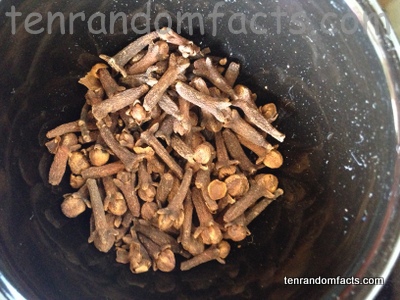Cloves add another interesting flavour.
- Cloves are the unopened and dried flower buds of the clove tree, Syzygium aromaticum, that belongs to the myrtle family, Myrtaceae.
- Cloves are native to some of the Maluku Islands in Indonesia, and one of the biggest producers of the spice now is Africa’s Pamba Island.
- Cloves appear to be small nails, and the name comes from Latin ‘clavus’, meaning nail, and they are sometimes used with an orange to make pomanders.
- Cloves are popularly used as a spice in dishes of meat, curry, marinade and fruit, as well as baked goods, commonly in Asia, Africa and the Middle East.
- Cloves contain the chemical eugenol, which produces approximately 85% of the strong flavour.
- Cloves have been used in some cigarettes and can be used to repel ants.
- Cloves and their oil are sometimes used in medicine as a painkiller for toothaches.
- In the 1600s and 1700s, the Dutch East India Company had a monopoly on the growing and trading of cloves in Indonesia, and in 1770, Pierre Poivre, a French horticulturalist, secretly obtained some seedlings from the spice trees from Indonesia, which he eventually introduced to the islands of Mauritius and Réunion.
- Cloves are very high in manganese, and they also contain vitamin K and vitamin C, as well as small quantities of other minerals and vitamins.
- Cloves can be bought ground or whole, and the ground spice loses its flavour quickest.
Bibliography:
Clove, 2014, Wikipedia, http://en.wikipedia.org/wiki/Clove
Cloves, 2014, The World’s Healthiest Foods, http://www.whfoods.com/genpage.php?tname=foodspice&dbid=69






